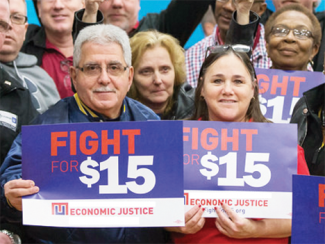SENSELESS
Why the outrage over raising the minimum wage?

C O M M E N T A R Y
John Baglow
THE OUTRAGE OVER MINIMUM WAGE RAISES IS REAL. The reasons for the outrage are not. Yet it persists. John Baglow tells us why he thinks that is.
WE REALLY NEED to put into context the current backlash (heck, it’s really a frontlash) against current and proposed increases in the minimum wage, now at various stages in Alberta, BC and Ontario.
Why the reaction? Because, naturally enough, businesses don’t like to have anything or anyone cut into their profits. And those who swear by the neoliberal premise attributed to John Kenneth Galbraith, that “the poor have too much money, and the rich don’t have enough” (please sing along) will join them behind the barricades of the super-wealthy. Bankers, financial pundits, conservative politicians…you know the drill.
Job losses! More inequality than ever! Inflation! (Yet, oddly, skyrocketing commercial rent increases, accounting for considerably more overhead costs than minimum wage increases, never seem to attract a similar outcry.)
But this opposition makes no sense, even from a business perspective. Increasing the minimum wage, as it turns out, is good for business.
Good for business and income equality
You don’t have to be an economist to know that consumers with more money make businesses prosper. Workers at the lower end of the income scale don’t send their money offshore to die. They buy food, pay rent, have an occasional evening out, purchase common household items, and so on. Those who sell those things sell more of them when consumers have more money to spend.
It’s a form of wealth redistribution, one relatively small measure to counter rising inequality.
We already have Canadian data to draw on, as Holly McKenzie-Sutter sets out in a recent paper published by the Canadian Foundation for Labour Rights.
Alberta, under Premier Rachel Notley, was the first province to take the plunge, with a series of minimum wage increases instituted in 2015 that will culminate in a $15/hour floor this coming October. The minimum wage exemption for liquor servers, which discriminates against women, was abolished. Some 300,000 workers will benefit. Organizations like the Canadian Federation of Independent Business and Restaurants Canada kicked and screamed all the way—but the sky failed to fall.
Instead, in the midst of a recession in 2016, 26,500 new jobs in Alberta’s service sector were created, and another 12,500 jobs were added in 2017. By last September, restaurant and bar spending were at an all-time high.
Ontario has also embarked upon a phased-in increase, affecting 623,000 workers presently earning minimum wage. And BC is getting on board this coming January, benefiting another 400,000 workers. That province will also abolish the liquor server exemption, phasing it out by 2021 (Ontario has mandated an increase for these workers, but well short of the minimum wage).
That’s more than 1.3 million workers earning poverty-level wages in three provinces. One prevailing myth is that it’s mostly teenagers who get minimum wage, but only a third of them are: 41%, in fact, are over 25. Another fable is that prices will spiral: they do go up, but these rises are spread widely across consumers (including minimum wage workers with their new increases), with little impact upon demand.
Minimum wage raises long overdue
Minimum wages were really due for an increase in any case. Between 1977 and 2013, they increased by all of one cent, in real terms. With an increase to $15/hour in 2019, they’ll be up a dollar more than they were in 1977.
That’s not really much to ask for. Consider the difference between a minimum wage and an actual living wage. In Vancouver, for example, a living wage is over $20/hour. One way BC plans to deal with this gap is by improving the social wage: bringing in $10/day childcare, for example, and looking for ways to improve access to affordable housing.
But we have a very long way to go before our poorest workers are lifted clear of poverty, as the gap between rich and poor continues to widen. Why is a raised minimum wage, as one small but necessary component of that change? In the end, there’s really only one answer to that.
- 30 -












Add new comment